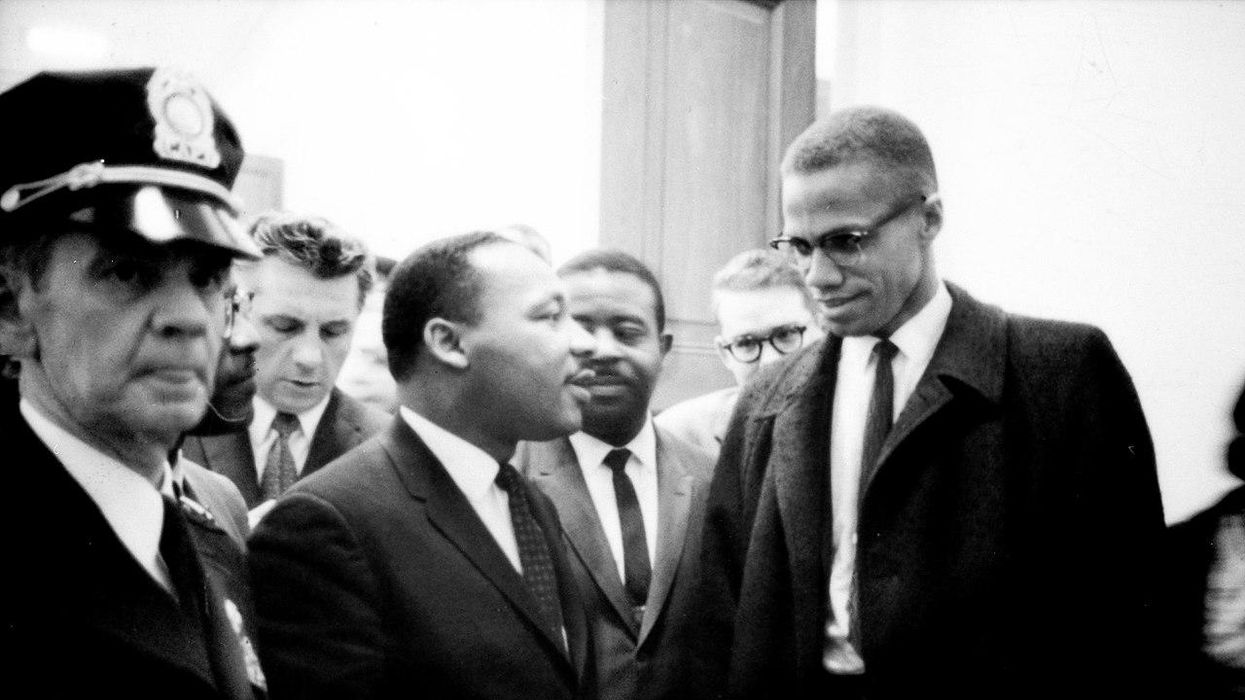How GOP-fueled 'anger politics' and racial fear-mongering are making life miserable for teachers and school officials

Dr. Martin Luther King, Jr. with Malcolm X in March 1964, Wikimedia Commons
November 19, 2021 | 06:59AM ETBank
Far-right MAGA Republicans, with the help of right-wing media, are great at getting their voters worked up over "crises" that don't really exist — for example, falsely claiming that "critical race theory" is inflicting harm in public schools. CRT is a manufactured "crisis"; it's a solution in search of an imaginary problem. But Jennifer C. Berkshire, in an article published by The Nation this week, describes some of the very real harm that far-right hysteria over CRT is inflicting on teachers and public school officials.
Critical race theory, a field of academic study taught on some college campuses — not in public high schools, middle schools or elementary schools — argues that the racism of the past affects institutions in the present. For example, racist Jim Crow apartheid laws were abolished in the southern states during the 1960s. But college professors who teach critical race theory would argue that those Jim Crow laws of the 1930s, 1940s and 1950s created long-lasting harm that continues to affect institutions in 2021.
But the fact that CRT studies aren't even offered in public schools hasn't stopped MAGA Republicans from pretending that they are. And Berkshire, in her article, stresses that anti-CRT hysteria has turned into a witch hunt with real consequences for teachers and school officials.
Berkshire points to Rickie Farah, a 4th Grade public school teacher in the Dallas suburb of Southlake, as an example of someone who was caught up in the anti-CRT hysteria. Farah's "crime," according to Berkshire, was that a student took home a copy of Tiffany Jewell's book, "This Book Is Anti-Racist: 20 Lessons on How to Wake Up, Take Action, and Do the Work." That book isn't teaching CRT, but as Berkshire explains, any book that deals with racial issues in any way can be considered CRT by far-right zealots.
READ: Evangelical warns Christians have 'erected a graven image' of Trump and let it corrupt the faith
"When the child's parents filed a complaint with the school district, alleging that the book was inappropriate, administrators declined to punish Farah," Berkshire reports. "Then Southlake's new conservative majority school board intervened. By a vote of three to two, members agreed to direct school administrators to place a letter of reprimand in Farah's personnel file, permanently blemishing the record of one of the district's star teachers."
Farah, according to Berkshire, is hardly an isolated case.
"In recent months," Berkshire explains, "debates over race and equity have roiled school districts across the country. More than 27 states have introduced legislation limiting how teachers can talk about race and racism in the classroom. But the enforcement of these measures will largely rest on parents, who've been newly deputized to ensure that teachers aren't teaching 'critical race theory' (CRT), a vague catchall that has rapidly expanded to include almost anything that conservatives don't like."
Berkshire adds, "A growing roster of parent groups — Moms for Liberty, No Left Turn, Parents Defending Ed — encourages parents to blow the whistle on indoctrination in the schools by filing anonymous reports and litigation. Meanwhile, proposals to train a watchful eye on teachers by placing cameras in the classroom are gaining steam."
READ: Trump used mass death as a political weapon — and it's the country's reaction that is truly shocking
In some school districts, merely mentioning Malcolm X or Medgar Evers in the classroom can result in a teacher being accused of teaching CRT.
Chris Larson, a Democrat who serves in the Wisconsin State Senate, describes Republican anti-CRT bills as "very Orwellian and scary." And April Jones Lee, a middle school math and history teacher and president of Johnston County Association of Educators in North Carolina, finds them troubling as well.
Lee, a former Republican, told The Nation, "This is about using anger politics to create issues that are not really issues. The world is changing, and the way we teach history and social studies is changing to reflect that world. I think some people are scared of that."